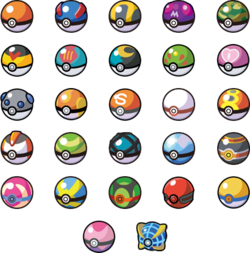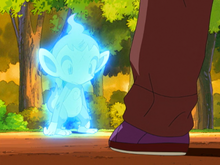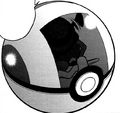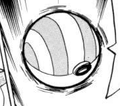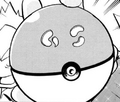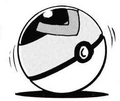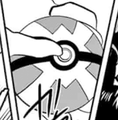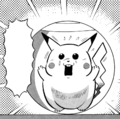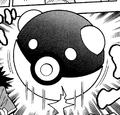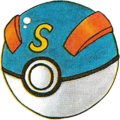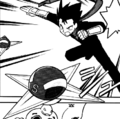A Poké Ball (Japanese: モンスターボール Monster Ball) is a type of item that is critical to a Trainer's quest, used for catching and storing Pokémon. Both a general term used to describe the various kinds as well as a specific term to refer to the most basic among these variations, Poké Balls are ubiquitous in the modern Pokémon world. Up to six Pokémon can be carried with a Trainer in Poké Balls, while more Poké Balls can be held in the Bag for later use. These six Pokémon in the Poké Balls can be attached to the user's belt for carrying them around. Some Pokémon do not like to be carried around in Poké Balls, such as Ash's Pikachu.
The strength of a Poké Ball is determined by how much it raises a wild Pokémon's catch rate, and may in fact vary depending on the conditions of the battle. Poké Balls limit the power of Pokémon contained inside, taming them, though they do not cause the Pokémon inside to always obey the Trainer.
Stylized Poké Balls are used in many places to symbolize Pokémon in general: the logos of all three Battle Frontiers feature a Poké Ball in their design, while several Poké Balls can be seen in every Pokémon Center. The headgear of the protagonists of Kanto, Hoenn, Sinnoh, and Unova-based games feature Poké Ball designs, as do the Bags of the protagonists of Johto-based games. Ethan's headgear is also similar to the top half of an Ultra Ball, and Lucas's Bag prominently features a Poké Ball.
History
- Main article: History of Poké Balls
The invention of Poké Balls occurred in the Johto region, where Apricorns grow; these fruit were cut apart and carved out, then fitted with a special device, and used to catch wild Pokémon prior to the mass production of the Balls that occurs in modern times under Silph Co., the Devon Corporation, and the Kalos Poké Ball Factory. Some Trainers still use Poké Balls made from Apricorns, while Kurt, a resident of Azalea Town, still constructs them. In the games, in the Memory Link event A New Light, Drayden claims that Poké Balls did not exist during his childhood. In the anime, in A Shipful of Shivers, Poké Balls are found in the ghost ship, implying that Poké Balls were first made at least 300 years ago. According to the Encyclopedia Pokemonica and a Pokémon Daisuki Club site describing the Pokémon world, modern Poké Balls were developed in 1925 from the research of Professor Westwood of Celadon University.
According to Pocket Monsters: The Animation, Poké Balls were developed to allow for various trainers to efficiently capture and train Pokémon in relatively little risk to themselves, as the act of training a Pokémon often results in severe injuries and even death. It also claims that the Pokémon Primeape and its notoriously violent nature was directly responsible for their creation.
Prior to the invention of Poké Balls, Pokémon were referred to as magical creatures (Japanese: 魔獣 majū), indicating that the name Pokémon, short for Pocket Monster, did not come into common parlance as a term until Poké Balls allowed the various magical creatures to be stored easily.
Mechanics and design

A schematic displaying Poké Ball size, storage, and mechanics
Though the technology behind a Poké Ball remains unknown and has evolved through the centuries to accommodate the diverse requirements of their creators, the basic mechanics are simple enough to understand and tend to remain constant: in a Pokémon battle, once an opposing wild Pokémon has been weakened, the Pokémon Trainer can throw a Poké Ball at it. When a Poké Ball hits the Pokémon, as long as it is not deflected, the Poké Ball will open, convert the Pokémon to a form of energy, pull it into its center, and close. A Pokémon in this state is given a chance to struggle to attempt to break free from the ball and escape, being instantly re-converted from energy into matter. Should a Pokémon escape a Poké Ball, the device will either be destroyed (in the games and some manga) or will return to the Trainer (anime), who can attempt once again to catch the Pokémon. A Pokémon who does not escape the Ball will be caught.
Poké Balls are specifically constructed for Pokémon capture, transport and training. As well as being physically difficult to escape from (as they seal tightly shut as soon as a Pokémon is taken into them) the environment of a Poké Ball is designed to be attractive to Pokémon also; according to Lucian of the Sinnoh Elite Four, weakened Pokémon instinctively curl up tight in an attempt to heal themselves, an action that the environment of the Poké Ball encourages. Furthermore, while it is not known how caught Pokémon perceives their time inside their Ball, the device is said to replicate a "Pokémon-friendly" environment that is "designed for comfort". All of these factors strongly discourage Pokémon from escaping their Balls. In the manga, Bugsy refers to his "capture net" as being the net that is supposedly inside a Poké Ball, but visible and already deployed. According to Kurt, this invisible net captures and physically stores a Pokémon.

Interior of a Poké Ball from the anime
Poké Balls are not always at full size. Pressing the button on the front will convert it between its full size, about the size of a baseball, to a smaller size, about that of a ping-pong ball, and back again. The larger size makes throwing the ball easier, while the smaller one makes for easier storage on a belt clip, in pockets, and in Bags.
As mentioned, the generic Poké Ball design is not constant and has been remodeled and altered innumerable times in order to create new Poké Balls that are adapted for specific conditions. For example, it is seen in several anime episodes such as Gulpin it Down! and Claydol Big and Tall that normal Poké Balls have difficulty catching Pokémon which are extremely large or extremely heavy. In the latter episode, it is revealed that ancient civilizations overcame this issue by constructing immense Poké Balls many times the size of the standard model known today, and made from stone instead. Other civilizations such as Pokémopolis also discovered new technologies that more closely resembled modern Poké Ball technology, such as the Dark Device and the Unearthly Urn, which were also adapted for the capture and storage of massive Pokémon but in small containers. However, devices like these became lost to the ages and their roles were subsequently supplanted by Heavy Balls in the modern world.
When a Pokémon is sent out from a Poké Ball, it will be accompanied by a distinctive sound effect and a bright light as it returns from its energy form and materialize nearby, often on the ground. This bright light has been shown to vary depending on the type of Ball in which the Pokémon is contained in the games, while it has always been shown to be white in the anime. Pokémon are recalled to their Poké Ball by holding up the Poké Ball with its button pointed at the Pokémon. A beam of red, white, or blue light will shoot from the button, converting the Pokémon back into energy and returning it to the Ball. The beam, however, has a limited range, and can be dodged by the Pokémon. If the beam hits a person, they will be stunned for a moment, but aside from that no ill effects will make themselves apparent.
Releasing a Pokémon from a Trainer's ownership, unlike normally sending the Pokémon out, will bathe the Pokémon in a blue glow, and the Poké Ball will no longer mark it, making it able to be caught by another Trainer's Poké Ball.
A Poké Ball can also be broken, which will release it from ownership, as seen when Jessie releases her Dustox in Crossing Paths. If a Trainer has done so accidentally, it must somehow be fixed before the Pokémon can be recalled. This was seen in Pokémon Food Fight!, where Ash becomes unable to recall Snorlax after its Poké Ball is broken. In the manga, if a Poké Ball is broken before a Pokémon is sent out, then that particular Pokémon cannot be used until their Poké Ball has been repaired. This happened several times in the Pokémon Adventures manga, such as during Red's battle against Giovanni, where the opening mechanism for the Poké Balls of Red's Venusaur and Gyarados were damaged, preventing either of them from being used in the match.
Pokémon appear to be conscious while inside Poké Balls. Several Pokémon have shown the ability to leave and return to their Poké Balls at will, most notably among them Jessie's Wobbuffet, Misty's Psyduck, Ash's Oshawott, Brock's Croagunk, and Clemont's Chespin which tend to do so in every episode they appear in. In Dig Those Diglett!, many Pokémon belonging to Gary Oak, as well as other Trainers, including Ash Ketchum, demonstrated the ability to prevent themselves from being sent from their Poké Balls, as they refused to fight against the Diglett, though this has not been demonstrated since. Pokémon have also shown to be able to hear orders given by their Trainer right before they are sent out.
Poké Balls are able to communicate with a Trainer's Pokédex, as the system updates itself with information on newly-caught Pokémon, and keeps track of how many Pokémon the Trainer has with them. If a Trainer catches a new Pokémon with the full six already with them, the Pokédex will automatically send the newly-caught Pokémon in its Poké Ball to the Pokémon Storage System that the Trainer is using. As shown in Two Degrees of Separation, a Pokémon caught by a Poké Ball is "marked" by it, and thus most Poké Balls thrown at it will have no effect aside from temporarily stunning it. In the games, as well as in Bad to the Bone, however, the Trainer of the Pokémon will block a Poké Ball thrown by another, though it is possible that this is more out of courtesy to their Pokémon than to prevent capture outright. In Charmander – The Stray Pokémon, Ash was able to catch his Charmander in a Poké Ball despite his previous ownership by another Trainer, though it may have lost its "mark" when it abandoned its previous Trainer by refusing to return to its old Poké Ball. Earlier in the same episode, Ash failed to catch the same Charmander while it still held its loyalty, despite its weak condition.
Other wireless capabilities of Poké Balls are shown in Destiny Deoxys, as when the electricity of the city is down, Rebecca claims that the "Poké Ball Management System" was no longer working without power. There has been no mention of any such system since.
Poké Balls are able to be decorated to no ill effect, with several Poké Balls that have been painted with special colors being seen in the anime. Additionally, a Ball Capsule can be used in combination with Seals to create special effects when the Pokémon is sent out.
Poké Ball accuracy
In some scenarios, a Poké Ball can miss the wild Pokémon completely (in contrast to breaking if the Poké Ball does not successfully capture the Pokémon):
- In the Generation I games, it was possible for a ball to miss the Pokémon when the likelihood of catching the Pokémon in question was particularly low—rather than the ball throwing animation playing and the ball wiggling zero times, a message would come up stating "You missed the Pokémon!".
- In the Generation I games and Pokémon FireRed and LeafGreen, the ghosts in Lavender Town's Pokémon Tower dodge any ball thrown at them before being unmasked by the Silph Scope. The Marowak ghost will dodge all Poké Balls even if it is unmasked.
In other scenarios, it is simply not possible to use Poké Balls in the first place:
- In the Generation I and II core series games, if both the player's party and their current Box are full, the player cannot throw a Poké Ball.
- In the core series games, in wild battles the player cannot throw a Poké Ball if there are multiple opponents—such as in wild Double Battles, Horde Encounters, or SOS Battles—with the game claiming that it's impossible to aim.
- From Pokémon Diamond and Pearl onward, it is not possible to throw a Poké Ball if the opposing Pokémon is in the semi-invulnerable state of a move (such as Fly or Dig).
- Starting in Generation V, in Double and Triple Battles, it is not possible to issue a command to one Pokémon and then throw a Poké Ball as the second Pokémon's turn. However, it is still possible to throw a Poké Ball if one Pokémon is in the middle of a two-turn move.
- In Black 2 and White 2, Ghetsis uses his cane to control a wild Kyurem and orders it to attack the player. The cane also emits signals that disrupt the use of empty Poké Balls, preventing Kyurem from being captured during the climax.
- In Sun and Moon, a player is forbidden from throwing Poké Balls at wild Pokémon in a trial site until the trial has been cleared.
- In Sun and Moon, a signal that prevents the use of empty Poké Balls is broadcast throughout Aether Paradise to protect the Pokémon living there. This prevents the player from capturing the wild Nihilego that attacks them on their first visit to the facility.
- In Ultra Sun and Ultra Moon, the player cannot use a Poké Ball on a Necrozma that has fused with a Solgaleo or Lunala.
Capture chances
- Main article: Catch rate
Types of Poké Balls
In the Pokémon games so far, there have been 27 different varieties of Poké Balls, all differing from each other in some effect, whether it be an increased ability to catch a Pokémon from the wild or an effect which occurs only after the Pokémon has been caught. From Generation III onward, each variety of the Poké Ball has a unique animation when they open to draw in a Pokémon and when a Pokémon is sent out, and the type of Poké Ball used to catch the Pokémon is preserved on its status screen.
Prior to Generation VI, all hatched Pokémon are in a standard Poké Ball. In Generation VI, a bred Pokémon will be in the same Poké Ball as its mother, unless its mother was in a Cherish Ball or Master Ball in which case the Pokémon will be in a Poké Ball; Pokémon bred from a male or genderless Pokémon and Ditto will hatch in a standard Poké Ball. In Generation VII, Pokémon bred from a male and a Ditto will inheret the father's ball as well and if two Pokémon of the same species in different balls are bred, the resulting offspring will be in either the mothers or father's ball.
Introduced in Generation I
The following Poké Balls were introduced in Pokémon Red and Green, and have appeared and been available in all games since then, with the exception of the Safari Ball, which is only available in Generations I, III, and IV. They were developed by Silph Co., with the development of the Master Ball factoring into the plot of the Generation I games and their remakes heavily.
|
|
|
Poké Ball
モンスターボール Monster Ball
|
|
|
|
|
|
| Price: $200
|
| Sell for: $100
|
|
|
|
|
| Locations
|
| RBY
|
Viridian, Pewter, Cerulean and Vermilion Poké Marts
|
| GSC
|
Cherrygrove*, Violet, Azalea, Goldenrod, Ecruteak, Mahogany*, Viridian and Celadon Poké Marts
|
| RSE
|
Oldale*, Petalburg, Rustboro, Slateport, Mauville, Lilycove Poké Marts
|
| FRLG
|
Viridian, Pewter, Cerulean and Vermilion Poké Marts
|
| Colo
|
Outskirt Stand
|
| XD
|
Gateon, Agate, Pyrite and Phenac Poké Marts, Pokémon HQ Lab, Cipher Lab, Outskirt Stand
|
| DPPt
|
All Poké Marts
|
| HGSS
|
All Poké Marts (after learning how to catch Pokémon)
Pokéwalker: Town Outskirts (0+ Steps)
|
| BW
|
All Poké Marts, Black City shopB
|
| B2W2
|
All Poké Marts, Join Avenue (Antique Shop, souvenir)
|
| XY
|
All Poké Marts, Poké Ball Factory, Couriway Town, Route 18, Santalune Forest, Route 2, PokéMileage Club (Mine Cart Adventure)
|
| ORAS
|
All Poké Marts, PokéMileage Club (Mine Cart Adventure)
|
| SM
|
All Poké Marts
|
|
|
|
| Description
|
| Stad
|
A Ball thrown at wild Pokémon to catch them.
|
| GSC
|
An item for catching Pokémon.
|
| RSE
|
A tool for catching wild Pokémon.
|
| FRLG
|
A Ball thrown to catch a wild Pokémon. It is designed in a capsule style.
|
| Colo XD
|
A tool for catching wild Pokémon.
|
DPPt
HGSS
|
A device for catching wild Pokémon. It is thrown like a ball at the target. It is designed as a capsule system.
|
| BWB2W2
|
A device for catching wild Pokémon. It is thrown like a ball at the target. It is designed as a capsule system.
|
| XYORAS
|
A device for catching wild Pokémon. It's thrown like a ball at a Pokémon, comfortably encapsulating its target.
|
| SM
|
A device for catching wild Pokémon. It's thrown like a ball at a Pokémon, comfortably encapsulating its target.
|
|
|
|
This item was featured in the TCG.
|
|
|
|
Great Ball
スーパーボール Super Ball
|
|
|
|
|
|
| Price: $600
|
| Sell for: $300
|
|
|
|
|
| Locations
|
| RBY
|
Lavender, Celadon, Saffron, Fuchsia, Cinnabar Island and Indigo Plateau Poké Marts
|
| GSC
|
Goldenrod, Ecruteak, Olivine, Mahogany, Blackthorn, Indigo Plateau, Pewter, Cerulean, Lavender, Saffron, Celadon and Fuchsia
|
| RSE
|
Petalburg*, Slateport, Mauville, Verdanturf, Fallarbor, Lavaridge, Fortree, Lilycove Poké Marts, PickupE
|
| FRLG
|
Lavender, Celadon, Saffron, Fuchsia, Cinnabar Island, Indigo Plateau, Four Island, Six Island and Seven Island Poké Marts, Two Island* stall
|
| Colo
|
Outskirt Stand, Pyrite Bldg
|
| XD
|
Agate, Pyrite and Phenac Poké Marts, Cipher Lab, Outskirt Stand, Pickup
|
| DPPt
|
All Poké Marts after earning 3 Badges, Pickup
|
| HGSS
|
All Poké Marts after earning 3 Badges, Join Avenue (Antique Shop, souvenir), Pickup
Pokéwalker: Town Outskirts (750+ Steps)
|
| BW
|
All Poké Marts after earning 1 Badge, Pickup
|
| B2W2
|
All Poké Marts after earning 1 Badge, Pickup
|
| XY
|
All Poké Marts after earning 1 Badge, Santalune City, Route 5, Route 4, PokéMileage Club (Mine Cart Adventure), Pickup
|
| ORAS
|
All Poké Marts after earning 1 Badge, PokéMileage Club (Mine Cart Adventure), Pickup
|
| SM
|
All Poké Marts after completing 1 trial, Pickup
|
|
| Description
|
| Stad
|
A Ball for catching wild Pokémon. More effective than a Poké Ball.
|
| GSC
|
A Ball with a decent success rate.
|
| RSE
|
A good Ball with a higher catch rate than a Poké Ball.
|
| FRLG
|
A good, quality Ball that offers a higher Pokémon catch rate than a standard Poké Ball.
|
| Colo XD
|
A good Ball with a higher catch rate than a Poké Ball.
|
DPPt
HGSS
|
A good, high-performance Ball that provides a higher Pokémon catch rate than a standard Poké Ball.
|
| BWB2W2
|
A good, high-performance Ball that provides a higher Pokémon catch rate than a standard Poké Ball.
|
| XYORAS
|
A good, high-performance Poké Ball that provides a higher Pokémon catch rate than a standard Poké Ball can.
|
| SM
|
A good, high-performance Poké Ball that provides a higher Pokémon catch rate than a standard Poké Ball.
|
|
|
|
This item was featured in the TCG.
|
|
|
|
Ultra Ball
ハイパーボール Hyper Ball
|
|
|
|
|
|
| Price: $1200
|
| Sell for: $600
|
|
|
|
|
| Locations
|
| RBY
|
Fuchsia, Cinnabar Island and Indigo Plateau Poké Marts
|
| GSC
|
Goldenrod saleC, Blackthorn, Indigo Plateau, Cerulean, Vermilion, Saffron, Celadon and Fuchsia Poké Marts
|
| RSE
|
Fortree, Lilycove, Mossdeep, Sootopolis, Ever Grande Poké Marts, Pickup
|
| FRLG
|
Fuchsia, Cinnabar Island, Indigo Plateau, Three Island, Four Island, Six Island and Seven Island Poké Marts, Two Island* stall
|
| Colo
|
Outskirt Stand, Pyrite Cave, The Under Subway, Snagem Hideout, Pickup
|
| XD
|
Gateon* and Phenac Poké Marts, Realgam Tower, Outskirt Stand, Snagem Hideout, Cipher Key Lair, Citadark Isle, Pickup
|
| DPPt
|
All Poké Marts after earning 5 Badges, Jubilife TV Pokémon Lottery Corner (1 digit)Pt, Pickup
|
| HGSS
|
All Poké Marts after earning 5 Badges, Goldenrod Radio Tower Pokémon Lottery Corner (1 digit), Pickup
Pokéwalker: Town Outskirts (2000+ Steps)
|
| BW
|
All Poké Marts after earning 5 Badges, Pickup
|
| B2W2
|
All Poké Marts after earning 5 Badges, Join Avenue (Raffle Shop, Antique Shop, souvenir), Pickup
|
| XY
|
All Poké Marts after earning 3 Badges, Victory Road, Laverre City, Route 6, Route 8. Camphrier Town, Sycamore Pokémon Lab (from Poké Radar Researcher for a chain length of a requested Pokémon; daily), PokéMileage Club (Mine Cart Adventure), Pickup
|
| ORAS
|
All Poké Marts after earning 3 Badges, PokéMileage Club (Mine Cart Adventure), Route 103 (rematch with Youngster Calvin), Route 104 (rematch with Lass Haley), Route 117 (rematch with Teammates Anna & Meg), Jagged Pass (rematch with Picnicker Diana), Secret Base ("Pick something up" with Secret Pal), Pickup
|
| SM
|
All Poké Marts after completing 4 trials, Festival Plaza (Lottery shop), Pickup
|
|
| Description
|
| Stad
|
A Ball for catching wild Pokémon. More effective than a Great Ball.
|
| GSC
|
A Ball with a high rate of success.
|
| RSE
|
A better Ball with a higher catch rate than a Great Ball.
|
| FRLG
|
A very high-grade Ball that offers a higher Pokémon catch rate than a Great Ball.
|
| Colo XD
|
A better Ball with a higher catch rate than a Great Ball.
|
DPPt
HGSS
|
An ultra-performance Ball that provides a higher Pokémon catch rate than a Great Ball.
|
| BWB2W2
|
An ultra-performance Ball that provides a higher Pokémon catch rate than a Great Ball.
|
| XYORAS
|
An ultra-high performance Poké Ball that provides a higher success rate for catching Pokémon than a Great Ball.
|
| SM
|
An ultra-high-performance Poké Ball that provides a higher success rate for catching Pokémon than a Great Ball.
|
|
|
|
This item was featured in the TCG.
|
|
|
|
| Cannot be bought
|
| Cannot be sold*
|
|
|
|
|
| Locations
|
| RBY
|
Silph Co.
|
| GSC
|
New Bark Town, Lucky Channel (all digits)
|
| RSE
|
Magma HideoutR/Aqua HideoutSE, Lilycove Department Store Pokémon Lottery Corner (all digits)
|
| FRLG
|
Silph Co.
|
| Colo
|
Agate Village
|
| XD
|
Pokémon HQ Lab
|
| DPPt
|
Team Galactic HQ, Jubilife TV Pokémon Lottery Corner (all digits)
|
| HGSS
|
New Bark Town, Goldenrod Radio Tower Pokémon Lottery Corner (all digits)
|
| BW
|
Opelucid City (from Professor Juniper after obtaining all eight Badges), Castelia City (from a man in the Pokémon Center after trading with 50 people)
|
| B2W2
|
Mistralton City (from Professor Juniper), Plasma Frigate (at P2 Laboratory, from Colress after first rematch), Join Avenue (Raffle Shop)
|
| XY
|
Poké Ball Factory , Loto-ID Center (all digits), PokéMileage Club (Mine Cart Adventure)
|
| ORAS
|
Team Magma HideoutOR/Team Aqua HideoutAS, Lilycove Department Store Pokémon Lottery Corner (all digits), PokéMileage Club (Mine Cart Adventure), Secret Base ("Pick something up" with Secret Pal)
|
| SM
|
Aether Paradise (from Gladion after defeating Lusamine), Festival Plaza (Lottery shop: Big Dreams)
|
|
| Description
|
| Stad
|
A Ball that captures any wild Pokémon without fail.
|
| GSC
|
The best Ball. It never misses.
|
| RSE
|
The best Ball that catches a Pokémon without fail.
|
| FRLG
|
The best Ball with the ultimate performance. It will catch any wild Pokémon without fail.
|
| Colo XD
|
The best Ball that catches a Pokémon without fail.
|
DPPt
HGSS
|
The best Ball with the ultimate level of performance. It will catch any wild Pokémon without fail.
|
| BWB2W2
|
The best Ball with the ultimate level of performance. It will catch any wild Pokémon without fail.
|
| XYORAS
|
The best Poké Ball with the ultimate level of performance. With it, you will catch any wild Pokémon without fail.
|
| SM
|
The best Poké Ball with the ultimate level of performance. With it, you will catch any wild Pokémon without fail.
|
|
|
|
|
Safari Ball
サファリボール Safari Ball
|
|
|
|
|
|
| Cannot be bought
|
| Cannot be sold
|
|
|
|
|
|
| Description
|
| Stad
|
A Ball used in the Safari Zone for catching wild Pokémon.
|
| RSE
|
A special Ball that is used only in the Safari Zone.
|
| FRLG
|
A special Ball that is used only in the Safari Zone. It is finished with a camouflage pattern.
|
| Colo XD
|
A special Ball that is used only in the Safari Zone.
|
DPPt
HGSS
|
A special Poké Ball that is used only in the Great Marsh. It is decorated in a camouflage pattern.
|
| BWB2W2
|
A special Poké Ball that is used only in the Great Marsh. It is decorated in a camouflage pattern.
|
| XYORAS
|
A special Poké Ball that is used only in the Great Marsh. It is recognizable by the camouflage pattern decorating it.
|
| SM
|
A special Poké Ball that is used only in the Great Marsh. It is recognizable by the camouflage pattern decorating it.
|
|
Introduced in Generation II
The following Poké Balls were introduced in Pokémon Gold and Silver. These Poké Balls were not available in Generation III or in Pokémon Diamond, Pearl, and Platinum, but made their return in Pokémon HeartGold and SoulSilver. Seven of them are made from Apricorns by Kurt, while the last, which is not made from Apricorns, is seen by some to be a counterpart to the Safari Ball, since is only used in the Bug-Catching Contest in National Park. All eight of these Poké Balls have the same animation as a normal Poké Ball when sending out or recalling a Pokémon, rather than the variety of colors and special effects the Poké Ball variants released in other generations have.
When a Pokémon in one of these Balls is used in a link battle in Generation IV, it will appear as an ordinary Poké Ball, regardless of if the link is made with a Johto or Sinnoh-based game. Using a Pokémon in one of these Balls in one of the Battle Frontier facilities will show it as it should appear during the battle, but as an ordinary Poké Ball if the battle is saved to the Vs. Recorder and played back. Trading a Pokémon in one of these Poké Ball variations into Diamond, Pearl, and Platinum or registering it in Pokémon Battle Revolution will cause it to display as a normal Poké Ball, though if the Pokémon is traded back into a Johto-based game or transferred forward into Generation V, it will regain its variant Ball.
In Generation IV, none of these Poké Balls can be held due to not existing in Pokémon Diamond, Pearl, and Platinum.
In Pokémon data, information for these Poké Balls on the status screen and in battle is stored in a separate location from the variants introduced in other generations, so that the Pokémon can be traded back to Diamond, Pearl, and Platinum from HeartGold and SoulSilver and display an ordinary Poké Ball there (the data space for these balls being ignored in the earlier games).
In Generation VII, only one of each ball (barring the Sport Ball) can be obtained, either on Mount Hokulani or from Samson Oak, but they cannot be sold.
|
|
|
Level Ball
レベルボール Level Ball
|
|
|
|
|
|
| Cannot be bought
|
| Sell for: $150*
|
|
| Effect:
|
Allows the player to catch wild Pokémon; works better on Pokémon of levels lower than the Pokémon currently in battle.
|
|
| Catch rate:
|
1× if the player's Pokémon is the same level as or a lower level than the wild Pokémon
2× if the player's Pokémon is at a higher level than the wild Pokémon but less than double it
4× if the player's Pokémon is more than double but less than four times the level of the wild Pokémon
8× if the player's Pokémon is of a level four times or more than that of the wild Pokémon
|
|
|
|
|
| Description
|
| GSC
|
A Ball for lower-level Pokémon.
|
| HGSS
|
A Poké Ball for catching Pokémon that are a lower level than your own.
|
| BWB2W2
|
A Poké Ball for catching Pokémon that are a lower level than your own.
|
| XYORAS
|
A Poké Ball that makes it easier to catch Pokémon that are at a lower level than your own Pokémon.
|
| SM
|
A Poké Ball that makes it easier to catch Pokémon that are at a lower level than your own Pokémon.
|
|
|
|
This item was featured in the TCG.
|
|
|
|
Lure Ball
ルアーボール Lure Ball
|
|
|
|
|
|
| Cannot be bought
|
| Sell for: $150*
|
|
|
|
| Catch rate:
|
3×GSCHGSS/5×SM if used on a Pokémon encountered while fishing
1× otherwise
|
|
|
|
|
| Description
|
| GSC
|
A Ball for Pokémon hooked by a rod.
|
| HGSS
|
A Poké Ball for catching Pokémon hooked by a Rod when fishing.
|
| BWB2W2
|
A Poké Ball for catching Pokémon hooked by a Rod when fishing.
|
| XYORAS
|
A Poké Ball that is good for catching Pokémon that you reel in with a Rod while out fishing.
|
| SM
|
A Poké Ball that is good for catching Pokémon that you reel in with a Rod while out fishing.
|
|
|
|
This item was featured in the TCG.
|
|
|
|
Moon Ball
ムーンボール Moon Ball
|
|
|
|
|
|
| Cannot be bought
|
| Sell for: $150*
|
|
|
|
|
|
|
|
| Description
|
| GSC
|
A Ball for Moon Stone evolvers.
|
| HGSS
|
A Poké Ball for catching Pokémon that evolve using the Moon Stone.
|
| BWB2W2
|
A Poké Ball for catching Pokémon that evolve using the Moon Stone.
|
| XYORAS
|
A Poké Ball that will make it easier to catch Pokémon that can evolve using a Moon Stone.
|
| SM
|
A Poké Ball that will make it easier to catch Pokémon that can evolve using a Moon Stone.
|
|
|
|
|
Friend Ball
フレンドボール Friend Ball
|
|
|
|
|
|
| Cannot be bought
|
| Sell for: $150*
|
|
|
|
|
|
|
|
| Description
|
| GSC
|
A Ball that makes Pokémon friendly.
|
| HGSS
|
A Poké Ball that makes caught Pokémon more friendly.
|
| BWB2W2
|
A Poké Ball that makes caught Pokémon more friendly.
|
| XYORAS
|
A strange Poké Ball that will make the wild Pokémon caught with it more friendly toward you immediately.
|
| SM
|
A strange Poké Ball that will make the wild Pokémon caught with it more friendly toward you immediately.
|
|
|
|
This item was featured in the TCG.
|
|
|
|
Love Ball
ラブラブボール Love-Love Ball
|
|
|
|
|
|
| Cannot be bought
|
| Sell for: $150*
|
|
| Effect:
|
Allows the player to catch wild Pokémon; works better on Pokémon of the opposite gender, but same species as the player's Pokémon.
|
|
| Catch rate:
|
8× if used on a Pokémon of the same species and gender as the player's PokémonGSC
8× if used on a Pokémon of the same species but opposite gender of the player's PokémonHGSSSM
1× otherwise
|
|
|
|
|
| Description
|
| GSC
|
For catching the opposite gender.
|
| HGSS
|
Poké Ball for catching Pokémon that are the opposite gender of your Pokémon.
|
| BWB2W2
|
Poké Ball for catching Pokémon that are the opposite gender of your Pokémon.
|
| XYORAS
|
A Poké Ball that works best when catching a Pokémon that is of the opposite gender of your Pokémon.
|
| SM
|
A Poké Ball that works best when catching a Pokémon that is of the opposite gender of your Pokémon.
|
|
|
|
|
Heavy Ball
ヘビーボール Heavy Ball
|
|
|
|
|
|
| Cannot be bought
|
| Sell for: $150*
|
|
|
|
| Catch rate:
|
-20 if used on Pokémon weighing at most 225.5 lbs.GSC*/451.3 lbs.HGSS*/220.2 lbs.SM*
No modifier if used on Pokémon weighing between 225.8 lbs.GSC/220.5 lbs.SM and 451.3 lbs.GSC/440.7 lbs.SM
+20 if used on Pokémon weighing between 451.5 lbs.GSCHGSS/440.9 lbs.SM and 677.0 lbs.GSCHGSS/661.2 lbs.SM
+30 if used on Pokémon weighing at least 661.4 lbs.SM
+30 if used on Pokémon weighing between 677.3 lbs. and 902.8 lbs.GSCHGSS
+40 if used on Pokémon weighing at least 903.0 lbs.GSCHGSS
|
|
|
|
|
| Description
|
| GSC
|
A Ball for catching heavy Pokémon.
|
| HGSS
|
A Poké Ball for catching very heavy Pokémon.
|
| BWB2W2
|
A Poké Ball for catching very heavy Pokémon.
|
| XYORAS
|
A Poké Ball that is better than usual at catching very heavy Pokémon.
|
| SM
|
A Poké Ball that is better than usual at catching very heavy Pokémon.
|
|
|
|
This item was featured in the TCG.
|
|
|
|
Fast Ball
スピードボール Speed Ball
|
|
|
|
|
|
| Cannot be bought
|
| Sell for: $150*
|
|
|
|
|
|
|
|
| Description
|
| GSC
|
A Ball for catching fast Pokémon.
|
| HGSS
|
A Poké Ball that makes it easier to catch fast Pokémon.
|
| BWB2W2
|
A Poké Ball that makes it easier to catch Pokémon which are quick to run away.
|
| XYORAS
|
A Poké Ball that makes it easier to catch Pokémon that are usually very quick to run away.
|
| SM
|
A Poké Ball that makes it easier to catch Pokémon that are usually very quick to run away.
|
|
|
|
This item was featured in the TCG.
|
|
|
|
Sport Ball
コンペボール Compé Ball
|
|
|
|
|
|
| Cannot be bought
|
| Cannot be sold
|
|
|
|
|
|
| Description
|
| GSC
|
The Bug-Catching Contest Ball.
|
| HGSS
|
A special Poké Ball for the Bug-Catching Contest.
|
| BWB2W2
|
A special Poké Ball for the Bug-Catching Contest.
|
| XYORAS
|
A special Poké Ball that is used during the Bug-Catching Contest.
|
| SM
|
A special Poké Ball that is used during the Bug-Catching Contest.
|
|
| Note: Called Park Ball (パークボール) in Generation II.
|
|
Introduced in Generation III
The following Poké Balls were introduced in Pokémon Ruby and Sapphire. While the main four Poké Balls and the Safari Ball returned to central usage, these specialty Balls were only available at certain Poké Marts in the Hoenn region, and the Luxury Ball only available via completion of certain quests in the games. Generally, they can be seen to be counterparts to Generation II's Apricorn Balls, which were not available in the Generation III games, with the Nest Ball and Level Ball, Net Ball and Lure Ball, and Luxury Ball and Friend Ball being very similar in effect to each other.
The Premier Ball is functionally identical to the standard Poké Ball; it is simply a premium (hence the name) given with the purchase of ten Poké Balls. Only one is given with each purchase of ten or more, so buying 20 or more Poké Balls still only yields one gift Premier Ball. To obtain multiple Premier Balls, the Poké Balls must be purchased in separate transactions of 10 at a time.
These Ball variants continued to be available in Pokémon FireRed and LeafGreen, though most must be traded in from a Hoenn-based game, with only the Timer Ball and Repeat Ball available to be bought, and even then, only in Two Island. The Dive Ball's effect was altered, with it now having greater chance to catch Pokémon encountered on water rather than under it, as Hoenn-based games are the only ones where wild Pokémon can be encountered while using Dive. In Generation IV, all but the Dive Ball are readily available to be bought, though the Dive Ball can still be obtained through use of Pal Park and other special events. The Johto-based HeartGold and SoulSilver make the Timer, Repeat, and Luxury Balls hard to find once more, though the returning Apricorn Balls help to take their place. All of these Poké Balls can be purchased in Generation V. Additionally, the Timer Ball's effectiveness now increases much more quickly as the battle goes on.
Unlike the Poké Balls introduced in Generation I, these Poké Balls were developed by the Devon Corporation.
|
|
|
Premier Ball
プレミアボール Premier Ball
|
|
|
|
|
|
| Price: $200
|
| Sell for: $100
|
|
|
|
|
|
| Description
|
| RSE
|
A rare Ball made in commemoration of some event.
|
| FRLG
|
A rare Ball that has been specially made to commemorate an event of some sort.
|
| Colo XD
|
A rare Ball made in commemoration of some event.
|
DPPt
HGSS
|
A somewhat rare Poké Ball that has been specially made to commemorate an event of some sort.
|
| BWB2W2
|
A somewhat rare Poké Ball that has been specially made to commemorate an event of some sort.
|
| XYORAS
|
A somewhat rare Poké Ball that was made as a commemorative item used to celebrate an event of some sort.
|
| SM
|
A somewhat rare Poké Ball that was made as a commemorative item used to celebrate an event of some sort.
|
|
|
|
This item was featured in the TCG.
|
|
|
|
Repeat Ball
リピートボール Repeat Ball
|
|
|
|
|
|
| Price: $1000
|
| Sell for: $500
|
|
| Effect:
|
Allows the player to catch wild Pokémon; works better on Pokémon that are registered in the Pokédex as caught.
|
|
| Catch rate:
|
3×Gen III-VI/3.5×SM if used on a Pokémon that is registered in the player's Pokédex as caught
1× otherwise
|
|
| Locations
|
| RSE
|
Rustboro City Poké Mart*
|
| FRLG
|
Two Island vendor*
|
| DPPt
|
Canalave City Poké Mart, Pokémon League Poké Mart, Pokémon News Press
|
| HGSS
|
Johto: Goldenrod Department Store lotteryTu
Pokéwalker: Sinnoh Field (3000+ Steps)
|
| BW
|
Pokémon League Poké Mart
|
| B2W2
|
Victory Road Poké Mart, Accumula Town Poké Mart
|
| XY
|
Coumarine City Poké Mart and the Poké Ball Boutique, Route 21, Route 20, Anistar City, PokéMileage Club (Mine Cart Adventure)
|
| ORAS
|
Rustboro City Poké Mart*, PokéMileage Club (Mine Cart Adventure), Route 110 (rematch with Collector Edwin)
|
| SM
|
Poni Wilds, Ula'ula Meadow, Festival Plaza, Paniola Town
|
|
| Description
|
| RSE
|
A Ball that works better on Pokémon caught before.
|
| FRLG
|
A somewhat different Ball that works especially well on Pokémon caught before.
|
| Colo XD
|
A Ball that works better on Pokémon caught before.
|
DPPt
HGSS
|
A somewhat different Poké Ball that works especially well on Pokémon species that were previously caught.
|
| BWB2W2
|
A somewhat different Poké Ball that works especially well on Pokémon species that were previously caught.
|
| XYORAS
|
A somewhat different Poké Ball that works especially well on Pokémon species that have been caught before.
|
| SM
|
A somewhat different Poké Ball that works especially well on a Pokémon species that has been caught before.
|
|
|
|
|
Timer Ball
タイマーボール Timer Ball
|
|
|
|
|
|
| Price: $1000
|
| Sell for: $500
|
|
| Effect:
|
Allows the player to catch wild Pokémon; works better in battles that have lasted longer.
|
|
| Catch rate:
|
((number of turns passed in battle + 10) ÷ 10)×, maximum 4×Gen III-IV
(1 + number of turns passed in battle * 1229/4096)×, maximum 4× Gen V-VII
|
|
| Locations
|
| RSE
|
Rustboro City Poké Mart*
|
| FRLG
|
Two Island vendor*
|
| Colo
|
Outskirt Stand, The Under Subway
|
| XD
|
Outskirt Stand, Citadark Isle
|
| DPPt
|
Celestic Town Poké Mart, Canalave City Poké Mart, Snowpoint City Poké Mart, Pokémon League Poké Mart, Pokémon News Press
|
| HGSS
|
Johto: Goldenrod Department Store lotterySa
Pokéwalker: Sinnoh Field (2500+ Steps)
|
| BW
|
Shopping Mall Nine, Opelucid City Poké Mart, Pokémon League Poké Mart
|
| B2W2
|
Opelucid City Poké Mart, Shopping Mall Nine, Victory Road Poké Mart and Icirrus City Poké Mart
|
| XY
|
Coumarine City Poké Mart, Snowbelle City Poké Mart, and the Poké Ball Boutique and South Boulevard, Route 19, Route 17, Geosenge Town, Poké Ball Factory, PokéMileage Club (Mine Cart Adventure)
|
| ORAS
|
Rustboro City Poké Mart*, PokéMileage Club (Mine Cart Adventure), Route 119 (rematch with Pokémon Ranger Catherine and Pokémon Ranger Jackson)
|
| SM
|
Blush Mountain, Festival Plaza, Paniola Town, Royal Avenue
|
|
| Description
|
| RS
|
More effective as more turns are taken in battle.
|
| E
|
A Ball that gains power in battles taking many turns.
|
| FRLG
|
A somewhat different Ball that becomes progressively better the more turns there are in a battle.
|
| Colo
|
A Ball that works better the more turns in battle.
|
| XD
|
A Ball that gains power in battles taking many turns.
|
DPPt
HGSS
|
A somewhat different Ball that becomes progressively better the more turns there are in a battle.
|
| BWB2W2
|
A somewhat different Ball that becomes progressively better the more turns there are in a battle.
|
| XYORAS
|
A somewhat different Poké Ball that becomes progressively more effective the more turns that are taken in battle.
|
| SM
|
A somewhat different Poké Ball that becomes progressively more effective the more turns that are taken in battle.
|
|
|
|
This item was featured in the TCG.
|
|
|
|
Nest Ball
ネストボール Nest Ball
|
|
|
|
|
|
| Price: $1000
|
| Sell for: $500
|
|
|
|
| Catch rate:
|
((40 - Pokémon's level) ÷ 10)×, minimum 1×Gen III-IV
((41 - Pokémon's level) ÷ 10)×, minimum 1×Gen V-VI
(8 - 0.2 * (Pokémon's level - 1))×, minimum 1×SM
|
|
| Locations
|
| RSE
|
Verdanturf Town Poké Mart
|
| FRLG
|
Rocket Hideout (hidden near Giovanni's seat), Rocket Warehouse (hidden near Gideon), Resort Gorgeous, Water Path (reward for a record-breaking Heracross)
|
| Colo
|
Outskirt Stand
|
| XD
|
Outskirt Stand
|
| DPPt
|
Eterna City Poké Mart, Hearthome City Poké Mart, Pastoria City Poké Mart, Pokémon League Poké Mart, Pokémon News Press
|
| HGSS
|
Johto: Goldenrod Department Store lotteryMo, Safari Zone Gate
Kanto: Pewter City Poké Mart, Vermilion City Poké Mart
Pokéwalker: Sinnoh Field (500+ Steps)
|
| BW
|
Castelia City Poké Mart, Driftveil City Poké Mart, Shopping Mall Nine, Pokémon League Poké Mart
|
| B2W2
|
Castelia City Poké Mart, Driftveil City Poké Mart, Lentimas Town Poké Mart, Shopping Mall Nine, Victory Road Poké Mart and Accumula Town Poké Mart
|
| XY
|
Lumiose City (North Boulevard Poké Mart), Cyllage City Poké Mart, Snowbelle City Poké Mart, and the Poké Ball Boutique, Reflection Cave, Route 13, PokéMileage Club (Mine Cart Adventure)
|
| ORAS
|
Verdanturf Town Poké Mart, PokéMileage Club (Mine Cart Adventure), Route 116 (rematch with Schoolkid Jerry and Schoolkid Karen)
|
| SM
|
Route 1, Route 2, Route 3, Lush Jungle, Royal Avenue
|
|
| Description
|
| RSE
|
A Ball that works better on weaker Pokémon.
|
| FRLG
|
A somewhat different Ball that works especially well on weaker Pokémon.
|
| Colo XD
|
A Ball that works better on weaker Pokémon.
|
DPPt
HGSS
|
A somewhat different Poké Ball that works especially well on weaker Pokémon in the wild.
|
| BWB2W2
|
A somewhat different Poké Ball that works especially well on weaker Pokémon in the wild.
|
| XYORAS
|
A somewhat different Poké Ball that becomes more effective the lower the level of the wild Pokémon.
|
| SM
|
A somewhat different Poké Ball that becomes more effective the lower the level of the wild Pokémon.
|
|
|
|
This item was featured in the TCG.
|
|
|
|
| Price: $1000
|
| Sell for: $500
|
|
|
|
| Catch rate:
|
3×Gen III-VI/3.5×SM if used on a Water-type or Bug-type Pokémon
1× otherwise
|
|
| Locations
|
| RSE
|
Mossdeep City Poké Mart
|
| FRLG
|
Silence Bridge on Route 12 (reward for a record-breaking Magikarp), Outcast Island, Rocket Warehouse, Rocket Hideout (hidden near Giovanni's seat)
|
| Colo
|
Outskirt Stand
|
| XD
|
Outskirt Stand
|
| DPPt
|
Eterna City Poké Mart, Hearthome City Poké Mart, Solaceon Town Poké Mart, Pokémon League Poké Mart, Pokémon News Press
|
| HGSS
|
Johto: Goldenrod Department Store lotteryWe, Ecruteak City Poké Mart, Blackthorn City Poké Mart, Frontier Access Poké Mart
Kanto: Viridian City Poké Mart
Pokéwalker: Noisy Forest (5000+ Steps), Blue Lake (4000+ Steps)
|
| BW
|
Nacrene City Poké Mart, Castelia City Poké Mart, Driftveil City Poké Mart, Shopping Mall Nine, Pokémon League Poké Mart
|
| B2W2
|
Virbank City Poké Mart, Castelia City Poké Mart, Driftveil City Poké Mart, Shopping Mall Nine, Humilau City Poké Mart and Victory Road Poké Mart
|
| XY
|
Lumiose City (North Boulevard Poké Mart), Cyllage City Poké Mart, Snowbelle City Poké Mart, and the Poké Ball Boutique, Route 12, Route 4, Route 15, Route 19, PokéMileage Club (Mine Cart Adventure)
|
| ORAS
|
Rustboro City Poké Mart*, PokéMileage Club (Mine Cart Adventure), Petalburg Woods (rematch with Bug Catcher James), Route 120 (rematch with Bug Maniac Brandon)
|
| SM
|
Route 7, Route 9, Brooklet Hill, Kala'e Bay, Melemele Meadow, Festival Plaza, Paniola Town
|
|
| Description
|
| RSE
|
A Ball that works well on Water- and Bug-type Pokémon.
|
| FRLG
|
A somewhat different Ball that works especially well on Water- and Bug-type Pokémon.
|
| Colo XD
|
A Ball that works well on Water- and Bug-type Pokémon.
|
DPPt
HGSS
|
A somewhat different Poké Ball that works especially well on Water- and Bug-type Pokémon.
|
| BWB2W2
|
A somewhat different Poké Ball that works especially well on Water- and Bug-type Pokémon.
|
| XYORAS
|
A somewhat different Poké Ball that is more effective when attempting to catch Water- or Bug-type Pokémon.
|
| SM
|
A somewhat different Poké Ball that is more effective when attempting to catch Water- or Bug-type Pokémon.
|
|
|
|
|
Dive Ball
ダイブボール Dive Ball
|
|
|
|
|
|
| Price: $1000
|
| Sell for: $500
|
|
|
|
| Catch rate:
|
3.5× if used while underwaterRSEORAS
3.5× if used on a water-dwelling PokémonOther games
1× otherwise
|
|
| Locations
|
| RSE
|
Mossdeep City Poké Mart
|
| DPPt
|
Route 223, Pokémon News Press
|
| HGSS
|
Pokéwalker: Beautiful Beach (5000+ Steps), Blue Lake (3500+ Steps)
|
| BW
|
Undella Town Poké Mart, Village Bridge
|
| B2W2
|
Undella Town Poké Mart, Humilau City Poké Mart
|
| XY
|
Ambrette Town (trade Poké Ball), Poké Ball Boutique, Route 16, Azure Bay, PokéMileage Club (Mine Cart Adventure)
|
| ORAS
|
Fallarbor Town Poké Mart, PokéMileage Club (Mine Cart Adventure), Route 125 (rematch with Sailor Ernest)
|
| SM
|
Route 8, Route 15, Brooklet Hill, Hano Beach, Kala'e Bay, Festival Plaza
|
|
| Description
|
| RSE
|
A Ball that works better on Pokémon on the ocean floor.
|
| FRLG
|
A somewhat different Ball that works especially well on Pokémon deep in the sea.
|
| Colo XD
|
A Ball that works better on Pokémon on the ocean floor.
|
DPPt
HGSS
|
A somewhat different Poké Ball that works especially well on Pokémon that live in the sea.
|
| BWB2W2
|
A somewhat different Poké Ball that works especially well on Pokémon that live underwater.
|
| XYORAS
|
A somewhat different Poké Ball that works especially well when catching Pokémon that live underwater.
|
| SM
|
A somewhat different Poké Ball that works especially well when catching Pokémon that live underwater.
|
|
|
|
|
Luxury Ball
ゴージャスボール Gorgeous Ball
|
|
|
|
|
|
| Price: $1000
|
| Sell for: $500
|
|
|
|
|
| Locations
|
| RSE
|
Abandoned Ship, Lilycove Contest Hall
|
| FRLG
|
Resort Gorgeous
|
| XD
|
S.S. Libra
|
| DPPt
|
Pokémon MansionPt, Sunyshore City Poké Mart, Pokémon League Poké Mart, Pokémon News Press
|
| HGSS
|
Johto: Goldenrod Department Store lotterySu
Pokéwalker: Resort (6000+ Steps)
|
| BW
|
Pokémon League Poké Mart, Undella Town Poké Mart, Black City shopB
|
| B2W2
|
Undella Town Poké Mart, Humilau City Poké Mart, Victory Road Poké Mart and N's Castle
|
| XY
|
Poké Ball Boutique, Professor Sycamore's Lab, Centrico Boulevard, PokéMileage Club (Mine Cart Adventure)
|
| ORAS
|
Verdanturf Town Poké Mart, PokéMileage Club (Mine Cart Adventure), Route 104 (rematch with Lady Cindy, rematch with Rich Boy Winston)
|
| SM
|
Route 2, Route 15, Malie Garden
|
|
| Secondary effect:
|
Alters the amount by which a caught Pokémon's friendship rises.
|
|
| Description
|
| RSE
|
A cozy Ball that makes Pokémon more friendly.
|
| FRLG
|
A comfortable Ball that makes a captured wild Pokémon quickly grow friendly.
|
| Colo XD
|
A cozy Ball that makes Pokémon more friendly.
|
DPPt
HGSS
|
A comfortable Poké Ball that makes a caught wild Pokémon quickly grow friendly.
|
| BWB2W2
|
A comfortable Poké Ball that makes a caught wild Pokémon quickly grow friendly.
|
| XYORAS
|
A particularly comfortable Poké Ball that makes a wild Pokémon quickly grow friendlier after being caught.
|
| SM
|
A particularly comfortable Poké Ball that makes a wild Pokémon quickly grow friendlier after being caught.
|
|
|
|
This item was featured in the TCG.
|
Introduced in Generation IV
The following Poké Balls were introduced in Pokémon Diamond and Pearl. The set of seven introduced in Generation III, as well as the original set of five, are preserved in this generation, and are available either for purchase or by trade in all Generation IV games.
|
|
|
Heal Ball
ヒールボール Heal Ball
|
|
|
|
|
|
| Price: $300
|
| Sell for: $150
|
|
|
|
|
| Locations
|
| DPPt
|
Jubilife City Poké Mart, Oreburgh City Poké Mart, Floaroma Town Poké Mart, Eterna City Poké Mart, Hearthome City Poké Mart, Pokémon League Poké Mart, Pokémon News Press
|
| HGSS
|
Johto: Cherrygrove City Poké Mart, Violet City Poké Mart, Azalea Town Poké Mart, Ecruteak City Poké Mart, Olivine City Poké Mart
Kanto: Viridian City Poké Mart
Pokéwalker: Stormy Beach (2000+ Steps)
|
| BW
|
Striaton City Poké Mart, Nacrene City Poké Mart, Castelia City Poké Mart, Shopping Mall Nine, Pokémon League Poké Mart
|
| B2W2
|
Virbank City Poké Mart, Castelia City Poké Mart, Lentimas Town Poké Mart, Shopping Mall Nine and Victory Road Poké Mart
|
| XY
|
Lumiose City (North Boulevard Poké Mart and Centrico Boulevard), Snowbelle City Poké Mart, and the Poké Ball Boutique, Route 7, Dendemille Town, PokéMileage Club (Mine Cart Adventure)
|
| ORAS
|
Verdanturf Town Poké Mart, PokéMileage Club (Mine Cart Adventure), Route 103 (rematch with Poké Fan Miguel), Route 110 (rematch with Poké Fan Isabel)
|
| SM
|
Route 2, Route 3, Hau'oli City, Seaward Cave, Paniola Ranch, Royal Avenue, Festival Plaza
|
|
| Secondary effect:
|
Fully restores a caught Pokémon's HP, PP, and status.
|
|
| Description
|
DPPt
HGSS
|
A remedial Poké Ball that restores the caught Pokémon's HP and eliminates any status problem.
|
| BWB2W2
|
A remedial Poké Ball that restores the caught Pokémon's HP and eliminates any status problem.
|
| XYORAS
|
A remedial Poké Ball that restores the HP of a Pokémon caught with it and eliminates any status conditions.
|
| SM
|
A remedial Poké Ball that restores the HP of a Pokémon caught with it and eliminates any status conditions.
|
|
|
|
|
Quick Ball
クイックボール Quick Ball
|
|
|
|
|
|
| Price: $1000
|
| Sell for: $500
|
|
| Effect:
|
Allows the player to catch wild Pokémon; works best when used during the first turn of the battle.
|
|
| Catch rate:
|
4×Gen IV/5×Gen V+ if used on the first turn of a battle
1× otherwise
|
|
| Locations
|
| DPPt
|
Pastoria City Poké Mart, Canalave City Poké Mart, Snowpoint City Poké Mart, Pokémon League Poké Mart, Pokémon News Press
|
| HGSS
|
Johto: Goldenrod Department Store lotteryTh, Safari Zone Gate
Kanto: Pewter City Poké Mart, Cerulean City Poké Mart, Vermilion City Poké Mart, Saffron City Poké Mart, Lavender Town Poké Mart, Fuchsia City Poké Mart
Pokéwalker: Stormy Beach (1500+ Steps)
|
| BW
|
Shopping Mall Nine, Opelucid City Poké Mart, Pokémon League Poké Mart
|
| B2W2
|
Opelucid City Poké Mart, Shopping Mall Nine, Victory Road Poké Mart, Icirrus City Poké Mart and Accumula Town Poké Mart
|
| XY
|
Coumarine City Poké Mart, Snowbelle City Poké Mart and the Poké Ball Boutique and South Boulevard, Poké Ball Factory, Victory Road, PokéMileage Club (Mine Cart Adventure)
|
| ORAS
|
Fallarbor Town Poké Mart, PokéMileage Club (Mine Cart Adventure), Route 114 (rematch with Poké Maniac Steve)
|
| SM
|
Route 8, Route 11, Paniola Town, Wela Volcano Park, Festival Plaza
|
|
| Description
|
DPPt
HGSS
|
A somewhat different Poké Ball that provides a better catch rate if it is used at the start of a wild encounter.
|
| BWB2W2
|
A somewhat different Poké Ball that provides a better catch rate if it is used at the start of a wild encounter.
|
| XYORAS
|
A somewhat different Poké Ball that has a more successful catch rate if used at the start of a wild encounter.
|
| SM
|
A somewhat different Poké Ball that has a more successful catch rate if used at the start of a wild encounter.
|
|
|
|
This item was featured in the TCG.
|
|
|
|
Dusk Ball
ダークボール Dark Ball
|
|
|
|
|
|
| Price: $1000
|
| Sell for: $500
|
|
|
|
| Catch rate:
|
3×SM/3.5×Gen III-VI if used in a cave or at night
1× otherwise
|
|
| Locations
|
| DPPt
|
Solaceon Town Poké Mart, Snowpoint City Poké Mart, Pastoria City Poké Mart, Pokémon League Poké Mart, Pokémon News Press
|
| HGSS
|
Johto: Goldenrod Department Store lotteryFr, Safari Zone Gate, Blackthorn City Poké Mart, Frontier Access Poké Mart
Kanto: Vermilion City Poké Mart, Lavender Town Poké Mart, Fuchsia City Poké Mart
Pokéwalker: Scary Cave (4000+ Steps), Quiet Cave (2000+ Steps)
|
| BW
|
Driftveil City Poké Mart, Shopping Mall Nine, Opelucid City Poké Mart, Pokémon League Poké Mart
|
| B2W2
|
Driftveil City Poké Mart, Lentimas Town Poké Mart , Opelucid City Poké Mart, Shopping Mall Nine, Victory Road Poké Mart and Icirrus City Poké Mart
|
| XY
|
Cyllage City Poké Mart, Snowbelle City Poké Mart, and the Poké Ball Boutique, Victory Road, Terminus Cave, Frost Cavern, Route 9, Poké Ball Factory, Lost Hotel (Trash Cans), PokéMileage Club (Mine Cart Adventure)
|
| ORAS
|
Fallarbor Town Poké Mart, PokéMileage Club (Mine Cart Adventure), Route 120 (rematch with Delinquent Sharlene and Street Thug Gomez)
|
| SM
|
Route 8, Route 14, Diglett's Tunnel, Memorial Hill, Vast Poni Canyon, Festival Plaza
|
|
| Description
|
DPPt
HGSS
|
A somewhat different Poké Ball that makes it easier to catch wild Pokémon at night or in dark places like caves.
|
| BWB2W2
|
A somewhat different Poké Ball that makes it easier to catch wild Pokémon at night or in dark places like caves.
|
| XYORAS
|
A somewhat different Poké Ball that makes it easier to catch wild Pokémon at night or in dark places like caves.
|
| SM
|
A somewhat different Poké Ball that makes it easier to catch wild Pokémon at night or in dark places like caves.
|
|
|
|
This item was featured in the TCG.
|
|
|
|
Cherish Ball
プレシャスボール Precious Ball
|
|
|
|
|
|
| Cannot be bought
|
| Sell for: $500
|
|
|
|
|
|
| Description
|
DPPt
HGSS
|
A quite rare Poké Ball that has been specially crafted to commemorate an occasion of some sort.
|
| BWB2W2
|
A quite rare Poké Ball that has been specially crafted to commemorate an occasion of some sort.
|
| XYORAS
|
A quite rare Poké Ball that has been crafted in order to commemorate a special occasion of some sort.
|
| SM
|
A quite rare Poké Ball that has been crafted in order to commemorate a special occasion of some sort.
|
|
|
|
|
Park Ball
パークボール Park Ball
|
|
|
|
|
|
| Cannot be bought
|
| Cannot be sold
|
|
| Effect:
|
Recatches Pokémon sent through Pal Park.
|
|
|
|
| Description
|
| HGSS
|
A special Poké Ball for the Pal Park.
|
| BWB2W2
|
A special Poké Ball for the Pal Park.
|
| XYORAS
|
A special Poké Ball for the Pal Park.
|
| SM
|
A special Poké Ball for the Pal Park.
|
|
| Note: Pokémon recaught with this ball in Pal Park will retain the ball in which they were originally caught in Generation III. Not to be confused with Sport Balls, which were known as Park Balls (パークボール) in Generation II. It is not programmed as an inventory item in Sinnoh games.
|
|
Introduced in Generation V
Only one new Poké Ball was introduced in Pokémon Black and White, though all Poké Balls of previous generations are programmed into the game, both as items and on the status screen. If the player cheats to get them into the game, the Apricorn Balls, Sport Ball, and Park Ball cannot be used to catch wild Pokémon, though the Safari Ball and Cherish Ball can. If a Pokémon is transferred to Generation V from an earlier generation with the Poké Transfer, it will appear to have the same ball it was originally caught with.
In the Entree Forest, when a player "speaks" to a Pokémon, a Dream Ball appears in the player's Bag. As Poké Balls never fail in the Entree Forest and the Dream Ball can only be used there, the Dream Ball effectively never fails. However, any Poké Ball in the Bag can be used in the Entree Forest, not just the Dream Ball. Pokémon transferred from Pokémon Dream Radar are obtained in Dream Balls.
|
|
|
Dream Ball
ドリームボール Dream Ball
|
|
|
|
|
|
| Cannot be bought
|
| Cannot be sold
|
|
|
|
|
|
| Description
|
| BWB2W2
|
A special Poké Ball that appears out of nowhere in a bag at the Entree Forest. It can catch any Pokémon.
|
| XYORAS
|
A special Poké Ball that appears in your Bag out of nowhere in the Entree Forest. It can catch any Pokémon.
|
| SM
|
A special Poké Ball that appears in your Bag out of nowhere in the Entree Forest. It can catch any Pokémon.
|
|
Introduced in Generation VII
Much like in Generation V, only one new type of Poké Ball was introduced in Pokémon Sun and Moon: the Beast Ball, specifically designed to catch Ultra Beasts. Other Poké Balls (except the Master Ball) will only work as well as a standard Poké Ball when used against Ultra Beasts[citation needed]. Conversely, Beast Balls are barely effective against Pokémon other than Ultra Beasts, only being 10% as effective as a regular Poké Ball. Beast Balls were apparently developed by Faba, building on the work of a predecessor.
In addition, the Apricorn Balls are once again available in Sun and Moon, although only one of each can be obtained per game without trading.
|
|
|
Beast Ball
ウルトラボール Ultra Ball
|
|
|
|
|
|
| Cannot be bought
|
| Cannot be sold
|
|
|
|
| Catch rate:
|
5× if used on an Ultra Beast
0.1× otherwise
|
|
|
| Description
|
| SM
|
A special Poké Ball designed to catch Ultra Beasts. It has a low success rate for catching others.
|
|
In other games
Pokémon GO
Using Poké Balls in Pokémon GO is a more detailed process than in most other games. The primary factor is the player's aim. The player must press their finger on the ball, move it, and release it in order to throw the ball. The ball and Pokémon exist in a 3D environment, so if the player moves their finger too far or too quickly, the ball can go past the Pokémon, or the ball can fall short or go to either side if the player otherwise misjudges.
So long as a thrown ball hits a Pokémon's model, the game will attempt to capture it, in much the same random process influenced by the ball type (Poké Ball, Great Ball, or Ultra Ball) as in the core games. A shrinking colored circle over the Pokémon indicates how easy the Pokémon will be to catch (given the type of ball currently being used), with green being easiest and red being hardest; usually this corresponds to the Pokémon's CP (higher being harder). Hitting the Pokémon is complicated by the Pokémon's actions, however. Pokémon may randomly jump or move around the area, potentially making a throw miss, or they may make an attack that temporarily makes them invulnerable to capture.
Two factors can also improve the chances of catching a Pokémon based on the player's technique. One is aiming for the shrinking colored circle over the Pokémon. If the player's throw lands inside this circle, they will get a bonus depending on how small the circle was (a "nice throw" when at its widest, a "great throw" if somewhat smaller, and an "excellent throw" when at its smallest sizes). When the circle shrinks to nothing, it resets to its widest and continues to shrink again. The other factor is throwing a curve ball. If the player spins the ball while holding it, it will temporarily retain that spin and can curve left or right when thrown (depending on the direction it was spun).
Using Berries can also help the player catch a Pokémon. The player can select a Berry (if they have any) with the button in the lower-left corner of the screen. Only one Berry can be used at a time and if the Pokémon breaks out of a thrown ball, the Berry's effect will disappear. A Razz Berry will improve the chances of the Pokémon being caught (which may be reflected in the color of the shrinking circle); a Golden Razz Berry will increase the chances by a greater amount. A Nanab Berry will cause the Pokémon to move and attack less, making it easier to hit. A Pinap Berry will double the amount of of Candy the player receives if it is caught.
Additionally, medals can improve the player's chances to catch Pokémon of a specific type. If a Pokémon has two types, the bonus of both applicable medals is averaged.
When the player catches a Pokémon, they earn XP, Candy, and Stardust.
Three types of Poké Balls are primarily available in Pokémon GO: regular Poké Balls, Great Balls, and Ultra Balls. They can be found by searching PokéStops or Gyms or as rewards for leveling up. Regular Poké Balls are available immediately from level 1, while Great Balls become available starting at level 12 and Ultra Balls at level 20. Regular Poké Balls can also be bought with PokéCoins at the Shop; all three types of balls have also been available in limited-time Box deals.
Premier Balls are also available in Pokémon GO exclusively for use in catching Raid Bosses; Raid Bosses can only be caught with Premier Balls and if the player runs out, the Raid Boss will flee. A number of Premier Balls are awarded to the player after a Raid Battle based on how well they battled. Even if the player does not use some of their Premier Balls, they will not retain any when they fight the next Raid Boss.
Master Balls are also coded into Pokémon GO, but they have never been made available.
In the anime
In the main series

Ash pulling out a Poké Ball, preparing to catch a Pokémon
In the anime, the basic Poké Ball is the most commonly used of all varieties, with other varieties appearing either very few times or not at all. A vast majority of Pokémon are shown to be stored in regular Poké Balls, to the point that large collections of Poké Balls can be seen with no variation among them. Even Ash's Pikachu, the most prominent Pokémon in the anime which spends all its time outside with Ash, has a plain Poké Ball that differs from others only by the small yellow lightning bolt symbol on it, as seen in Pokémon - I Choose You!.
Despite this, the various other types of Poké Ball have been seen in the anime, usually to illustrate a special property about that particular ball. The lack of the different types is unsurprising, however, due to the fact that, when the anime was first created, the games themselves did not even keep track of the Poké Ball that a Pokémon was caught in, and thus, it made no difference in sending a Pokémon out.
The first time that a Poké Ball aside from the normal variation was seen was in EP035, where Ash was given 30 Safari Balls in order to compete in the Safari Game. With these 30 Safari Balls, Ash attempted to catch various rare Pokémon; however, he only managed to capture an entire herd of Tauros. They appeared in Safari Balls in Showdown at the Po-Ké Corral; however, whenever Ash uses one of his Tauros in a battle, it is sent out from a standard Poké Ball.
The GS Ball was the second of the variant Poké Balls to appear in the anime, this time with a special purpose. This mysterious ball was unable to be opened by Professor Ivy, and served as the reason for Ash's journeys to the Orange Archipelago (to pick it up) and Johto (to deliver it to Kurt), so that what was contained within it could be discovered. Celebi was long rumored to be related to the ball, something which the Pokémon Adventures and game canons verify, while a director of the anime confirmed that, had it not been insisted that Celebi appear in a central role in the fourth movie, the GS Ball arc would have concluded with Celebi being released from the ball and traveling with Ash and his friends.
Also related to Kurt, as in the games, the first non-standard Poké Ball variants, the Apricorn balls, made an appearance in the anime, and several were given to the members of the main cast. All three members of the main cast received a Fast Ball each in Going Apricorn!, with Brock using his to catch a Pineco shortly after receiving it. Many other Apricorn Poké Balls also appeared in a fantasy in this episode. In the next episode, Brock received a Heavy Ball, while Ash and Misty received a Lure Ball each. While Brock's Heavy Ball and Ash and Misty's Fast Balls would remain unused (and have not been mentioned since), both Ash and Misty would use their Lure Balls to capture a Totodile and Corsola, respectively. Another Heavy Ball appeared in Gulpin It Down, where it was used to capture a giant Gulpin, though this was not the one belonging to Brock. In Trouble's Brewing, the Kimono Sisters (excluding Sakura) were shown keeping their Eeveelutions inside Apricorn Poké Balls, with Satsuki's Jolteon's ball being a Moon Ball, Sumomo's Vaporeon's ball being a Lure Ball, and Satsuki's Umbreon's ball being a Fast Ball. While Koume's Flareon's ball wasn't shown, her kimono pattern indicates it being a Love Ball.
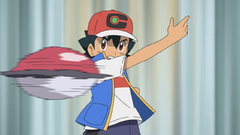
Ash calling out a Pokémon
The Master Ball itself has only appeared once as an actual Poké Ball, in Whiscash and Ash, where it was used by Sullivan in a last resort attempt to catch a wild Whiscash called "Nero". Despite the fact that a Master Ball cannot be escaped from, the Whiscash swallowed the Master Ball, thus preventing capture, and disappeared back into the water. While not a Poké Ball itself, Misty owns a beach ball that is designed like the Master Ball, which can be seen in Beauty and the Beach and A Hot Water Battle.
The Generation III specialty balls have mostly been seen in cameos. The Repeat Ball and Luxury Ball appeared in the opening of Jirachi: Wish Maker. These balls contained Brendan's Shiftry and Aggron, respectively.
The debut of most of the specialty balls, both from Generation III and IV, came in the ending Which One ~ Is It?, which contained the first appearance of the Great Ball and Ultra Ball, as well as the first anime appearance of the Premier, Heal, Net, Dusk, Nest, Quick, Timer, and Dive Balls.
The first proper appearance of the Great, Ultra, Net, Nest, Dusk, Dive, Repeat, Premier, and Heal Balls was in A Frenzied Factory Fiasco!, where these balls were seen being manufactured at the Poké Ball Factory, in addition to normal Poké Balls, Luxury Balls, and Safari Balls, although the last one was not shown. Although James did mention a Quick Ball in the Japanese version, one was never shown in the episode (a fact that was picked up by the dub, which removed the Quick Ball reference). Team Rocket tried to steal many of these Poké Balls, but were foiled by Ash and his friends.
Gladion keeps his Lycanroc in an Ultra Ball, as shown in A Glaring Rivalry!, and his Type: Null in a Premier Ball, as shown in Rising from the Ruins!.

Dawn's Poké Balls with Ball Capsules and Seals
It was revealed in First Catch in Alola, Ketchum-Style! that James had been collecting Poké Balls. When Jessie's attempt to catch a Mimikyu with a typical Poké Ball failed, she grabbed the Luxury Ball James had been polishing and used it instead, capturing Mimikyu, much to James's dismay.
Many other Poké Balls have been shown in the anime; however, most of these are cosmetic alterations alone, such as Poké Balls with gold plating, diamond studded Poké Balls, and Poké Balls with stickers or special designs on them, usually to denote an organization. Ball Capsules and Seals can also be used to customize a Poké Ball's appearance, and they add special effects when the Pokémon is sent out. In the anime, they are mostly used by Coordinators during Pokémon Contests to create a showy entrance and ensure that the Pokémon will make a good impression right out of the Poké Ball.
Most notably, a broken Poké Ball, snapped in half at its rusted hinges, is kept by both Ash and Gary, symbolizing their rivalry.
In Mystery at the Lighthouse, it was shown that if a Trainer catches a Pokémon while they already have six on hand, it is automatically sent to the regional Professor. Sewaddle and Burgh in Pinwheel Forest shows a major difference in what happens after a Pokémon is captured. Instead of being automatically sent to the regional Professor, the Poké Ball is sealed and the button becomes red. The Pokémon is kept inactive until it is switched out by another actively in the Trainer's party.
History
- Main article: History of Poké Balls
Appearance
A Love, Friend, Moon, and Level Ball
Two Lure Balls and a Heavy Ball
A Park Ball (called Sport Ball in Generation IV)
A Luxury Ball and Repeat Ball
Nest, Dusk, and Great Balls
A Premier Ball and Net Ball
Pokédex entries
| Episode
|
Subject
|
Source
|
Entry
|
| EP001
|
Poké Ball
|
Ash's Pokédex
|
While being trained, a Pokémon usually stays inside its Poké Ball. However, there are many exceptions. Some Pokémon hate being confined.
|
|
In Pokémon Origins
Besides the regular Poké Ball, the other Generation I variations of it were also seen during the Pokémon Origins mini-series. In File 3: Giovanni, it was shown that Giovanni kept his strongest Pokémon, Rhyhorn and Rhydon, within Ultra Balls. In File 4: Charizard, Red was seen catching an Arbok with a Great Ball and a Chansey with a Safari Ball. He also used Ultra Balls to capture the Legendary Pokémon Articuno, Zapdos, Moltres, and Mewtwo.
The Master Ball only appeared in a demonstration in File 3: Giovanni, as it was still under development at the time. After Team Rocket was driven out of the Silph Co. building by Red, the development of the Master Ball was put on hold for a while.
Additionally, in Pokémon Origins, the sound effects and bright light used when a Trainer is catching, sending out, or recalling a Pokémon differ in comparison to the sound effects and lights that are used in the main Pokémon anime, more resembling the effects seen in Pokémon FireRed and LeafGreen.
Red holding a Safari Ball
In Pokémon Generations
The only Poké Ball variant seen in Pokémon Generations was an Ultra Ball, which appeared in The Scoop. It was shown being used by a Trainer to catch a Deoxys.
In the manga
In the various Pokémon manga, Poké Balls have been shown to appear differently, as an attempt to explain how a Trainer knows which Pokémon is in which ball, as most Pokémon manga series were, like the anime, developed at a time when the games could not keep track of the ball a Pokémon was contained in.
In The Electric Tale of Pikachu manga
In the manga The Electric Tale of Pikachu, the rules are more similar to the anime; however, Poké Balls are numbered on the outside, on the button, so that a Trainer knows which member of their team they are sending into battle. In The Electric Tale of Pikachu, Trainers must obtain a license before they are legally allowed to purchase Poké Balls.
It is also possible for a Pokémon to be placed inside a Poké Ball without it being owned by a Trainer. In Days of Gloom and Glory, Meowzie steals a Poké Ball from a shop and puts her kitten in it so that it will not be hurt by a flood affecting the city.
In the Magical Pokémon Journey manga
In Magical Pokémon Journey, the main characters generally do not capture Pokémon, rather, they befriend them. Although Almond, one of the main characters, is known to be a Pokémon Trainer, he is not actually depicted capturing or raising any Pokémon. In fact, in the bonus materials of Volume 2, in which the cast of the manga meet Ash, Misty and Brock in a series of crossovers, it is revealed that Hazel and Coconut do not even know what Poké Balls are. When Ash and Misty explain that they are used to capture Pokémon, they both proceed to attempt to use them to capture Almond, as he is each of their love interest.
In the Pokémon Adventures manga
In the Pokémon Adventures manga, the tops of Poké Balls are semitransparent, allowing the Pokémon inside, which is miniaturized, to be seen through the ball, while the Pokémon can likewise see out of the ball it is contained in. In this manga, unlike in the anime, Pokémon already captured can be recaught in another Poké Ball, as is seen when Red recatches Misty's Gyarados (though Blue states that catching a Pokémon that belongs to another is not possible in Lapras Lazily). Like in the anime and games, specialty balls do exist, and Gold and Silver received a Friend Ball and Heavy Ball, respectively. Crystal and Emerald have also been shown using special balls to catch Pokémon. Like in the games, but unlike the anime, Pokémon placed in their balls don't recover from status conditions nor regain lost health, no matter how much time passes. Additionally, the three original types of Poké Ball are used to identify the Trainer's rank; most Trainers keep their Pokémon in Poké Balls, Gym Leaders use Great Balls, and Elite Four members and Frontier Brains use Ultra Balls.
A Lure, Moon, and Love Ball
Generation III Poké Balls (Net, Dive, Nest, Repeat, Timer, Luxury, and Premier Balls)
In the Pokémon Gotta Catch 'Em All manga
In Pokémon Gotta Catch 'Em All, Poké Balls are depicted as solid, with no visual identification as to which Poké Ball is which. In Special Chapter - Get Pikachu!, it is revealed that when Shu met Pikachu, Pikachu's Poké Ball had been abandoned in a forest because it was defective and it was causing Pikachu's electricity to be released throughout the surrounding area.
In the Pokémon Pocket Monsters manga
In Pokémon Pocket Monsters, Poké Balls are often shown as transparent to identify when a Pokémon is inside. They usually have their typical appearance from far away, suggesting that they may not always be transparent, or are only see-through from up close. Pokémon appear to be able to see the world outside of their Poké Balls, as shown in Bring Down the Powerful Opponent Onix!!, when Clefairy sees Pikachu inside his Poké Ball, and they talk to each other. In Introducing the Pokémon Clefairy!!, when Green is choosing Charmander as his starter Pokémon, he is shown to be able to pick up and lift Charmander directly from the Poké Ball without throwing it first.
Heavy Ball in Pocket Monsters HGSS
In the TCG
Several variants of Poké Ball have been released in card form in the Pokémon Trading Card Game, ranging from the standard variants found in the games and other media to variants specific to the TCG.
- The standard Poké Ball card, which was the first released, debuted in the Jungle expansion and has since been featured in many others. It features a TCG-centric mechanic, requiring a coin flip to search the deck for a Pokémon to be put in the hand. Most of the Poké Ball variants, both adapted from the games and exclusive to the TCG, are similar to this, with several requiring coin flips to use their effect.
- The Ultra Ball can be seen in the artwork of Rocket's Sneak Attack, from the Team Rocket expansion. The 'H' on this Ultra Ball is derived from its Japanese name, Hyper Ball. The Ultra Ball itself would appear in Dark Explorers, with its effect requiring the player to discard 2 cards from the hand to search the deck for a Pokémon.
- The Great Ball, which first appeared in the TCG expansion coinciding with the remakes of the Generation I games, is somewhat of an upgrade to the Poké Ball, and does not require the coin flip that the Poké Ball does, instead restricting the search to Basic Pokémon. Later, in Emerging Powers, Great Ball's effect was changed to have the player search the top 7 cards of the deck for any one Pokémon card and put it in the hand.
- The Master Ball, first appearing in the Gym Challenge expansion, and in the games the most powerful of the Poké Balls, provides a vastly different effect than the standard. Rather than searching the entire deck, only the top seven cards may be searched. One Pokémon found in these seven can be put into the hand, while the rest must be shuffled back into the deck. In Plasma Blast, the Master Ball was changed to an Ace Spec that allowed the player to search the entire deck for any one Pokémon.
- Debuting in the Skyridge expansion, the Lure Ball is different from the basic Poké Balls in that it draws from the discard pile rather than the deck. For each heads flipped, with a maximum of three, an Evolution card can be returned from the discard pile and put into the hand. It has not appeared since.
- Also debuting in Skyridge, the Friend Ball, another Apricorn Ball, has a unique effect entirely, allowing the user to search their deck for a Pokémon of the same type as one of the opponent's Pokémon, making it effective in decks that typically match up well against their own type. It also has not appeared since.
- The Fast Ball allows the player to go through their deck, turning over cards one at a time until they find the first evolution card, and then taking that into their hand, shuffling afterward. Like the other two Apricorn Balls, it debuted in Skyridge and has not appeared since.
- The Premier Ball, debuting in the Great Encounters expansion, is special, much as in the games, and allows the player to search either the deck or the discard pile for a Pokémon LV.X to put into their hand.
- The Luxury Ball, first found in the Stormfront expansion, is among the rarest of the Poké Ball varieties in the games, though its catch rate is the same as that of a normal Poké Ball. Likewise it is so with the TCG, allowing a non-LV.X Pokémon to be searched from the deck, but only if another Luxury Ball card is not in the discard pile.
- The Quick Ball released in the Mysterious Treasures expansion has a similar effect to the Fast Ball released in Skyridge, allowing the player to uncover cards from their deck until they find a Pokémon. An expansion of the Fast Ball's use, any Pokémon can be found, though this may prove an issue if the player is looking for an Evolution card specifically and finds a Basic Pokémon first, and vice versa.
- The Dusk Ball, also first found in Mysterious Treasures, features an effect somewhat opposite from the Master Ball's: Instead of the top seven cards being searched, only the bottom seven cards may be, and a Pokémon found there may be put into the player's hand.
- The Heavy Ball, first found in Next Destinies, allows the player to search through their deck for a Pokémon who has a retreat cost of 3 or more and put it in their hand, whereas the Level Ball, also found in Next Destinies, allows them to do the same with a Pokémon that has 90 HP or less.
In the Super Smash Bros. series
In the Super Smash Bros. series, Poké Balls mainly appear as items which a character can pick up and throw to release a random Pokémon. Most Pokémon will perform a direct attack against the characters on the stage, but some may have other effects. Like many other items, the Poké Balls also do damage simply by hitting other characters. The fourth game in the series also introduced a Master Ball variant on the Poké Ball, which essentially functions the same as a Poké Ball except that it usually contains a Legendary or Mythical Pokémon.
The Pokémon that can appear from Poké Balls differ between the games. The Poké Ball Pokémon in Super Smash Bros. all come from Generation I, the Poké Ball Pokémon in Super Smash Bros. Melee come from up to Generation II, the Poké Ball Pokémon in Super Smash Bros. Brawl come from up to Generation IV, and the Poké Ball Pokémon in Super Smash Bros. for Nintendo 3DS/Wii U come from up to Generation VI. The only Pokémon that have appeared in all four games are Goldeen, Snorlax, and Mew.
The Poké Ball also features in a couple of other ways in the Super Smash Bros. series. In Brawl, in The Subspace Emissary, Pokémon Trainer is shown to push the button on the Poké Ball to send out his Pokémon, a mechanic that has not been shown in the anime. A Poké Ball logo is also used to represent the Pokémon games in the Super Smash Bros. series. In the third and fourth games, this logo is updated to match Generation IV's redesigned icon.
The Pokémon series's symbol from SSB and Melee
The Pokémon series's symbol from Brawl and SSB4
These balls are used to catch and contain wild Pokémon. Most Pokémon must be weakened in some way before they can be caught, but once they're inside a Poké Ball, they enjoy their new home, since Poké Balls contain an environment specially designed for Pokémon comfort. Master Balls are the strongest type.
"An item used for capturing Pokémon and calling them out into battle. Pokémon live in these items which despite appearances, actually contain a wide, comfortable Pokémon-friendly world inside them. In Super Smash Bros., Pokémon give temporary support to who calls them out. You never know which you will get, but some are devastatingly powerful."
Poké Ball

The Poké Ball in Super Smash Bros. for 3DS
NA: An item used to call out different Pokémon. Which Pokémon emerges is a mystery, but it will aid whoever threw the Poké Ball. Some of the Pokémon contained inside are extremely powerful and will really intensify the battle. It's definitely worth beating your opponents to these!
PAL: A ball holding one of any number of Pokémon just waiting to burst out and help you in battle. Which kind will it be? Well, that's a surprise, but whichever one it is, it'll definitely up the intensity of the battle! If you see one, make sure you're the one to grab it!
Master Ball

The Master Ball in Super Smash Bros. for 3DS
NA: These valuable, powerful balls can capture any wild Pokémon. In Smash Bros., hard- to-find Pokémon often pop out of them. You can easily identify a Master Ball by the distinct purple appearance and large M on the top. A Pokémon within a Master Ball may turn the tide of battle.
PAL: A rare type of Poké Ball that never fails to catch a Pokémon. Throw one in this game, and the Mythical or Legendary Pokémon inside will come to your aid. Master Balls are easy to identify due to their purple colour and the large M on them. Use one to quickly turn the tide of any battle!
Other variants
The following Poké Ball variants are found outside of the standard games. They are often very unusual compared to the 27 types found in the games, and it is sometimes questionable whether or not they even qualify as Poké Balls. Many have separate articles, where their unique properties are described in greater detail.
In the games
- Pester Balls: These objects, which appear similar to Poké Balls at a glance, are not used to catch Pokémon, and instead will release a Pokémon repellent on contact. They are only found in Pokémon Snap.
- The GS Ball is an event item that appears only in Pokémon Crystal, where it was part of a giveaway on the Pokémon Mobile System GB for Japanese games, similar to event items given out via Nintendo Wi-Fi Connection and Nintendo Network from Generation IV onward. It was not used to catch any Pokémon, and was placed in the Key Items pocket. If given to Kurt for inspection, it will activate an event where the player can catch a Celebi in Ilex Forest.
- A Snag Ball is a Poké Ball variant that has been "unlocked" by the Snag Machine, allowing it to snag an already-caught Pokémon during a battle. While it is able to be used on any Pokémon, Rui will only allow Wes to use it on Shadow Pokémon, while Michael's Aura Reader will render the Snag Machine inoperable when a Pokémon other than a Shadow Pokémon is targeted.
- When transferring Pokémon via Poké Transfer, a blue-colored Poké Ball is used to catch the Pokémon in the mingame. They are shot using a bow.
- Typing Balls are used in Learn with Pokémon: Typing Adventure. They are thrown after one successfully types a Pokémon's name. It has the overall design like that of a normal Poké Ball, only having an additional vertical line at the bottom, resembling the letter "T".
- In the Timegate Traveler Series featured in Pokéstar Studios, the future is ruled by Bug-type Pokémon that capture wild humans in Human Balls (Japanese: ヒューマンボール Human Ball) instead of the other way around.
Original Great Ball artwork from Red and Green, with the 'S' from its Japanese name 'Super Ball'
Wes about to throw a Great Ball turned into a Snag Ball
In the anime
- A green Poké Ball appeared in Pokémon - I Choose You!. Interestingly, the cover of the book Grass Pokédex greatly resembles this Poké Ball, and is labeled as a Safari Ball.
- Several objects were used to contain and control Pokémon before Poké Balls themselves were developed. Large monumental objects have been shown several times in episodes to be containers for large ancient Pokémon, as seen most notably in The Ancient Puzzle of Pokémopolis. Smaller objects have also been used, such as the staff belonging to Sir Aaron, which contained his partner, Lucario, until Ash released it in the current era. Special armor developed by Marcus was used to control Pokémon in ancient Michina Town, though it did not directly contain the Pokémon; unlike other methods of using Pokémon, these Pokémon were enslaved, instead of befriended, and they turned against him the moment the armor was broken.
- Mewtwo had a collection of strange Poké Balls in Mewtwo Strikes Back, which incorporated an eye into their design, and were used primarily to capture Pokémon to be cloned. These balls had no trouble catching Pokémon which were already captured—even if they were already inside of Poké Balls. They have been called by several names by fans, such as "Mewtwo Balls" and "Clone Balls".
- Molly Hale, whose imagination caused the power of the Unown to change the world around them, was able to use strange, crystalline Poké Balls when she challenged Brock and Misty in Spell of the Unown: Entei. The Pokémon sent from these appeared normally, but dissolved into crystal, rather than being recalled. These crystal Poké Balls only appeared when used by her imagined older selves, and do not appear to actually exist.
- A special variant of Poké Ball, the Lake Ball, was used during the Seaking Catching Competition in Hook, Line, and Stinker; this is viewed by many to be similar to the Sport Ball used in the Bug-Catching Contest. They appear as blue and white Poké Balls, with a fish pattern around the edge, and a yellow arrow on the top and bottom of the ball. They don't shake after capture, implying an automatic catch.
- Older Poké Balls have also appeared in the anime, specifically the one carried by Sammy in Celebi: Voice of the Forest, which was colored differently, and it had a knob that needed to be twisted before the Pokémon inside could be sent out. While it is unknown how these types were manufactured, it is likely that they were made by hand using Apricorns, prior to the standardization and mass production of modern-day Poké Balls.
- The Iron-Masked Marauder, an agent of Team Rocket, used special Dark Balls that corrupted Pokémon caught inside them and made them into mindless servants of the Trainer, as well as raising their power significantly. Multiple Pokémon were caught in these Poké Balls, including the Mythical Celebi and a powerful Tyranitar. They seem capable of catching any Pokémon without fail.
- As in the games, the GS Ball appeared in the anime, and was the primary motivation for Ash's trip to the Orange Archipelago, where he would compete in his second Pokémon League. It also served as the catalyst for his journey to Johto, as he needed to deliver the ball to Kurt. Former director Masamitsu Hidaka revealed that a shelved storyline, that would have concluded the GS Ball's arc, involved a Celebi that would have traveled with Ash and his friends through at least part of Johto. The storyline was viewed as redundant after the decision was made to introduce Celebi in the fourth movie instead.
- Claydol, Big and Tall featured the "Stone Ball", a huge Poké Ball made of stone used to keep an evil, giant Claydol that levied destruction everywhere. This Poké Ball is about the size of a 2-story house.
- In Battling the Enemy Within!, an ancient relic resembling a Poké Ball was first mentioned by Brandon, who told Ash and his friends a story about the King of Pokélantis, who had once tried to control Ho-Oh for his own evil purposes. When Ash later found the relic, it was revealed that the King of Pokélantis's spirit was actually sealed within it, and it possessed Ash until it was banished from his body and resealed back inside the relic.
- In A Fishing Connoisseur in a Fishy Competition!, a specially marked Poké Ball, called the "Fishing Poké Ball", was used in the fake fishing contest set up by Team Rocket. This Poké Ball highly resembled the regular red and white Poké Ball, except that it had a dark fish mark on its red part.
A promotional toy version of Annie and Oakley's Poké Balls, produced by Tomy
In the manga
In The Electric Tale of Pikachu manga
- In Haunting My Dreams, a giant Poké Ball named the Enormo Poké Ball-X1 (Japanese: ビッグモンスターボールX1 Big Monster Ball-X1) or EPB-X1 for short, was created to capture the gigantic Haunter, Black Fog. It was destroyed when the Black Fog used Explosion to free itself after being captured.
In the Pokémon Adventures manga
In addition to various Poké Balls introduced in the games, Pokémon Adventures also has several Trainers modifying their Poké Balls to suit their fighting styles.
- Bruno has modified his Poké Balls so that they are fitted onto the ends of his nunchucks. By swinging them quickly and throwing the nunchuck forward, Bruno can have his Pokémon quickly attack his opponent, giving him the advantage.
- Koga and his daughter Janine modified their Poké Balls into shuriken to fit their ninja theme. In addition to being used as weapons, they can also be used to have their Pokémon pop up from different locations to surprise the opponent or to hold items to help an ally.
- Bugsy had Kurt modify his butterfly net into something he calls a Capture Net. His net has a Poké Ball nested into the middle of it. The bag of the net is made of the same material of the inside of a Poké Ball. Once a Pokémon is covered in the bag, they will automatically be sucked into the Poké Ball.
- Falkner has modified his Poké Balls into boomerangs using the feathers of his Skarmory. Because of Skarmory's feathers being transparent, they have the tendency to turn invisible, confusing enemies when Falkner throws them in random directions only for them to turn around and go straight for them.
- Erika modified her Poké Balls to be at the end of her arrows.
Bruno's nunchuck with Poké Balls on them
Koga's shuriken Poké Ball
Falkner's boomerang Poké Balls
Erika with one of her Poké Ball arrows
In the TCG
- The Dual Ball is merely two Poké Balls together, and has a similar effect to using two plain Poké Ball cards, requiring two coin flips to search for up to two Pokémon, depending on how many heads appear.
- The Team Magma Ball is Team Magma's Poké Ball variant, found only in the EX Team Magma vs Team Aqua expansion. It works similarly to a Poké Ball, however, it only can be used to find Team Magma's Pokémon, and will still allow a player to find a Pokémon, though only a Basic one, if the coin flip results in tails.
- The Team Aqua Ball is Team Aqua's Poké Ball variant, also found only in the EX Team Magma vs Team Aqua expansion. It works exactly the same as the Team Magma Ball, with the exception that it can only search out Team Aqua's Pokémon instead.
- The Rocket's Poké Ball is the Team Rocket variation on the Poké Ball, found in the EX Team Rocket Returns expansion. No coin flip is required, and it simply allows the player to search for a Dark Pokémon.
- The Team Plasma Ball is the Team Plasma variant of the Poké Ball, found in the Plasma Freeze expansion. It allows the user to search for a Team Plasma Pokémon without a coin flip required.
Item balls
- Main article: Item → Obtaining items
In both the anime and games, it has been shown that items can be contained in Poké Balls, apparently able to be captured in much the same way as a Pokémon. The anime has used this as a gag on several occasions, most notably in Primeape Goes Bananas, where Ash accidentally catches a rice ball when he throws a Poké Ball in an attempt to catch a wild Mankey.
Items contained in Poké Balls have been present from the very first games, with many items that are found on the field being found in Poké Balls in conspicuous locations. These items are sometimes important, and usually will be among the required items for pickup along the way. Sometimes, even Poké Ball variants can be found in item balls, though it may be that the item ball itself is supposed to represent the ball that is found. Many other items, however, are hidden, and are not in item balls, instead being directly on the field, and can be found more easily using an Itemfinder or Dowsing Machine.
Voltorb, Electrode, Foongus, and Amoonguss often appear as item balls in the overworld, but attack when interacted with except the Foongus in Accumula Town.
Artwork

|

|

|

|

|
| Poké Ball
|
Great Ball
|
Ultra Ball
|
Master Ball
|
Safari Ball
|

|

|

|

|

|
| Level Ball
|
Lure Ball
|
Moon Ball
|
Friend Ball
|
Love Ball
|

|

|

|

|

|
| Heavy Ball
|
Fast Ball
|
Premier Ball
|
Repeat Ball
|
Timer Ball
|

|

|

|

|

|
| Nest Ball
|
Net Ball
|
Dive Ball
|
Luxury Ball
|
Heal Ball
|

|

|

|
| Quick Ball
|
Dusk Ball
|
Cherish Ball
|
These are artwork of the items as seen in the Pokémon Dream World and Pokémon Global Link.

|

|

|

|

|
| Poké Ball
|
Great Ball
|
Ultra Ball
|
Master Ball
|
Safari Ball
|

|

|

|

|

|
| Level Ball
|
Lure Ball
|
Moon Ball
|
Friend Ball
|
Love Ball
|

|

|

|

|

|
| Heavy Ball
|
Fast Ball
|
Sport Ball
|
Premier Ball
|
Repeat Ball
|

|

|

|

|

|
| Timer Ball
|
Nest Ball
|
Net Ball
|
Dive Ball
|
Luxury Ball
|

|

|

|

|

|
| Heal Ball
|
Quick Ball
|
Dusk Ball
|
Cherish Ball
|
Park Ball
|
|
|

|
|

|
|
|
|
Dream Ball
|
|
Beast Ball
|
|
These are artwork of the items as seen in Pokémon Red and Green.
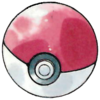
|
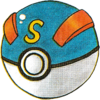
|

|
| Poké Ball
|
Great Ball
|
Master Ball
|
These are artwork of the items as seen in Pokémon GO.
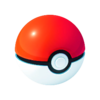
|
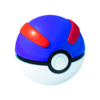
|
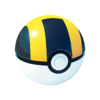
|
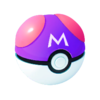
|
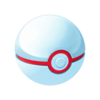
|
| Poké Ball
|
Great Ball
|
Ultra Ball
|
Master Ball
|
Premier Ball
|
Summary sprites
Generation III
Ruby, Sapphire, FireRed, LeafGreen, and Emerald
Battle sprites are the same as summary sprites.
| Poké Ball
|

|
Great Ball
|

|
Ultra Ball
|
File:Ultra Ball III.png
|
Master Ball
|

|
| Safari Ball
|

|
Premier Ball
|

|
Repeat Ball
|

|
Timer Ball
|

|
| Nest Ball
|

|
Net Ball
|

|
Dive Ball
|

|
Luxury Ball
|

|
Colosseum
| Poké Ball
|

|
Great Ball
|

|
Ultra Ball
|

|
Master Ball
|

|
| Safari Ball
|

|
Premier Ball
|

|
Repeat Ball
|

|
Timer Ball
|

|
| Nest Ball
|

|
Net Ball
|

|
Dive Ball
|

|
Luxury Ball
|

|
XD
| Poké Ball
|

|
Great Ball
|

|
Ultra Ball
|

|
Master Ball
|

|
| Safari Ball
|

|
Premier Ball
|

|
Repeat Ball
|

|
Timer Ball
|

|
| Nest Ball
|

|
Net Ball
|

|
Dive Ball
|

|
Luxury Ball
|

|
Generations IV and V
| Poké Ball
|

|
Great Ball
|

|
Ultra Ball
|

|
Master Ball
|

|
Safari Ball
|

|
| Level Ball
|

|
Lure Ball
|


|
Moon Ball
|

|
Friend Ball
|

|
Love Ball
|

|
| Heavy Ball
|

|
Fast Ball
|

|
Sport Ball
|

|
Premier Ball
|

|
Repeat Ball
|

|
| Timer Ball
|

|
Nest Ball
|

|
Net Ball
|

|
Dive Ball
|

|
Luxury Ball
|

|
| Heal Ball
|

|
Quick Ball
|

|
Dusk Ball
|

|
Cherish Ball
|

|
Dream Ball
|

|
In battle sprites
Generation I
| Any Poké Ball
|

|
Generation II
Poké Ball
Love Ball
|

|
Great Ball
Lure Ball
Fast Ball
|

|
Ultra Ball
Friend Ball
|

|
Master Ball
|

|
Level Ball
|

|
Moon Ball
Heavy Ball
Park Ball
|

|
Generation III
Battle sprites are the same as summary sprites.
Generation IV
| Poké Ball
|

|
Great Ball
|

|
Ultra Ball
|

|
Master Ball
|

|
Safari Ball
|

|
| Level Ball
|

|
Lure Ball
|

|
Moon Ball
|

|
Friend Ball
|

|
Love Ball
|

|
| Heavy Ball
|

|
Fast Ball
|

|
Sport Ball
|

|
Premier Ball
|

|
Repeat Ball
|

|
| Timer Ball
|

|
Nest Ball
|

|
Net Ball
|

|
Dive Ball
|

|
Luxury Ball
|

|
| Heal Ball
|

|
Quick Ball
|

|
Dusk Ball
|

|
Cherish Ball
|

|
Park Ball
|

|
Generation V
The Apricorn Poké Balls, the Safari Ball, and the Sport Ball, while programmed into the game, cannot be used to catch Pokémon and can be seen only in the Pokémon summary screen or when sending out a Pokémon. Sprites seen below are at full size as they are seen as they are when player's Pokémon is sent out after a switch.
| Poké Ball
|

|
Great Ball
|

|
Ultra Ball
|

|
Master Ball
|

|
Safari Ball
|

|
| Level Ball
|

|
Lure Ball
|

|
Moon Ball
|

|
Friend Ball
|

|
Love Ball
|

|
| Heavy Ball
|

|
Fast Ball
|

|
Sport Ball
|

|
Premier Ball
|

|
Repeat Ball
|

|
| Timer Ball
|

|
Nest Ball
|

|
Net Ball
|

|
Dive Ball
|

|
Luxury Ball
|

|
| Heal Ball
|

|
Quick Ball
|

|
Dusk Ball
|

|
Cherish Ball
|

|
Dream Ball
|

|
Pokémon Stadium
Outside of battles, Generation I Poké Balls (except the Safari Ball) are all seen in the minigame Furret's Frolic in Pokémon Stadium 2. Poké Ball is worth 1 point, Great Ball 2, Ultra Ball 3 and Master Ball 5.
Furret's Frolic
| Poké Ball
|

|
Great Ball
|

|
Ultra Ball
|

|
Master Ball
|
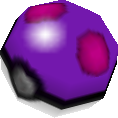
|
On instructions screen
| Poké Ball
|

|
Great Ball
|

|
Ultra Ball
|

|
Master Ball
|

|
Trivia
- Professor Oak has written senryū about the Poké Ball in two of his lectures:
- Only the Scyther family and Pinsir can legitimately be obtained in all of the 27 in-game Poké Ball variants.
- In Pokémon Pinball, the Poké Balls serve as the balls in the machine; they can be used to capture Pokémon and are upgraded depending on the multiplier bonus at the time.
- In Generation II, the Park Ball's name is written as one word on the in-battle menu during the Bug-Catching Contest, where it takes the place of the Pack command. However, when the ball is used, its name is formatted properly.
- In some early artwork for Pokémon Red and Green, Poké Balls are shown on the ground in two pieces while the Pokémon are in battle, rather than in the more familiar hinged form they take now. This may be a carryover from when Pokémon was known as Capsule Monsters, as the Poké Ball sprites in Generation I also do not show the button on the ball. In Generation II, Poké Balls split in half when capturing a Pokémon as part of their animation, while the anime had been using the hinge style since the very first episode.
- Poké Balls are inspired by the capsules for gashapon machines, which contain small, handheld toys.
- In HeartGold and SoulSilver and the TCG, Lure Balls are shown to have a green outer coloring; however, in official artwork and the anime, they are shown to have a blue outer coloring. In later games, the Lure Ball's color is changed to the official blue color.
- Similarly, the Fast Ball is shown to be red in official art; however, it is orange in its Bag and status screen sprites, and only appears red in battle in Generation V.
- In Generation II, after catching a Pokémon, the Poké Ball's color palette changes to that of the Pokémon that was just caught. It then changes back to normal thereafter.
- Both the Safari Ball and Generation II Park Ball appeared in the anime prior to sprites being introduced for items in the games, in EP035 and The Bug Stops Here, respectively. In these appearances, their designs were vastly different from their later-introduced in-game sprites.
- When the player uses a Master Ball in Generation II, stars appear and a sound effect is played before the ball closes and captures the Pokémon.
- A similar effect would later be used in subsequent generations for all Poké Ball captures (regardless of the variety of Poké Ball used), beginning with Pokémon FireRed and LeafGreen.
- Starting in Generation III, all Poké Ball types have a special effect that appears whenever the ball is opened. These special effects also can be seen in Pokémon Colosseum and Pokémon XD: Gale of Darkness. In Generation IV, customizable special effects are available through Seals.
- Although the Hyper Ball was renamed the Ultra Ball in the English versions of the games, its design still incorporates a stylized H on the top half.
- In Pokémon Shuffle, the Great Ball is twice as effective as the Poké Ball.
- In Generation VII, a Heavy Ball will always fail to catch a Pokémon whose weight is less than 220.46 lbs and whose catch rate is less than or equal to 20. This is because the game will set the catch rate to 0 when the catch rate becomes negative due to the -20 modifier that is applied. The only catchable Pokémon in Generation VII that this affects are Beldum and the guardian deities.
- The Global Link artwork for the Sport Ball has the letter S on the top dome instead of an image of a Poké Ball.
In other languages
Master Ball
- Main article: Master Ball → In other languages
